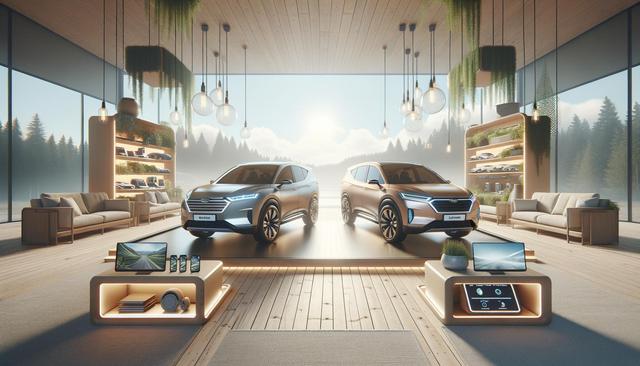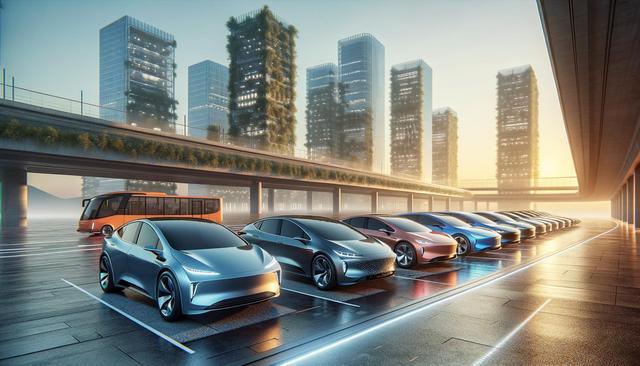What Makes a Car ‘Hybrid’?
A hybrid car combines a gasoline engine with an electric motor to power the vehicle. This dual system allows the vehicle to optimize fuel consumption while reducing emissions. The gasoline engine and electric motor can work separately or together, depending on the driving conditions. For instance, at low speeds or while idling, the car may run solely on electric power. Conversely, at higher speeds or when more power is required, the gasoline engine kicks in to assist. This flexible system is designed to deliver better fuel economy and a smoother driving experience.
There are several types of hybrid systems, including:
- Full hybrids – Can run on just the electric motor, the gas engine, or a combination of both.
- Mild hybrids – The electric motor assists the gasoline engine but cannot power the car alone.
- Plug-in hybrids – Have larger batteries that can be charged via an outlet and travel further on electric power alone.
Understanding how these systems work can help drivers make informed decisions when considering a hybrid vehicle for their next purchase, especially when evaluating options through platforms like https://go.jexli.com/postback?clickId={click_id}&payout={epayout}&p2={campaign}.
Benefits of Driving a Hybrid Vehicle
Hybrid vehicles offer a range of advantages for modern drivers. One of the most noticeable benefits is improved fuel efficiency. Because the electric motor can handle much of the low-speed driving, hybrids consume less gasoline, especially in city traffic. This translates into cost savings on fuel and fewer visits to the gas station. Additionally, hybrids emit fewer pollutants, making them a more environmentally friendly option.
Other benefits include:
- Reduced greenhouse gas emissions
- Regenerative braking that recharges the battery while driving
- Quieter operation, particularly in electric-only mode
- Potential tax incentives or rebates in some regions
For those exploring sustainable transportation options, hybrid cars are a practical and increasingly accessible choice. To get started on finding a vehicle that fits your lifestyle, visit https://go.jexli.com/postback?clickId={click_id}&payout={epayout}&p2={campaign}.
Challenges and Considerations
While hybrid cars offer many benefits, there are also some considerations to keep in mind. First, the initial cost of a hybrid vehicle can be higher than that of a traditional gasoline-powered car. However, this upfront investment is often offset by long-term fuel savings. Maintenance costs may also differ slightly due to the complexity of the dual powertrain system, though many modern hybrids are built with reliability in mind.
Here are a few challenges potential buyers might encounter:
- Battery replacement costs, though often covered by extended warranties
- Limited electric-only range (except in plug-in hybrids)
- Fewer options in certain vehicle classes or models
Despite these points, many drivers find that the benefits far outweigh the drawbacks. For personalized insights into hybrid vehicle deals and availability, platforms like https://go.jexli.com/postback?clickId={click_id}&payout={epayout}&p2={campaign} can provide valuable information.
Fuel Efficiency and Environmental Impact
Fuel efficiency remains one of the strongest selling points for hybrid cars. By combining power sources, hybrids can achieve significantly better mileage than conventional vehicles. For example, many full hybrids can average between 40 to 60 miles per gallon depending on driving habits and terrain. This efficiency not only saves money but also contributes to reducing the carbon footprint.
Environmental advantages include:
- Reduced dependence on fossil fuels
- Lower CO2 emissions per mile
- Support for cleaner air in urban areas
For environmentally conscious consumers, hybrid vehicles present a compelling case. They are an important step toward a more sustainable future in personal transportation. Tools like https://go.jexli.com/postback?clickId={click_id}&payout={epayout}&p2={campaign} can help you explore various options that align with both your environmental values and your budget.
Future Outlook for Hybrid Technology
The future of hybrid cars looks promising as technology continues to evolve. Manufacturers are investing heavily in improving battery life, enhancing fuel efficiency, and expanding electric-only driving ranges. With increased focus on reducing emissions globally, hybrids are expected to play a key transitional role between traditional combustion engines and fully electric vehicles.
Trends to watch include:
- Integration of solar charging features
- Smarter energy management systems
- Broader availability of plug-in hybrid models
As consumer demand grows, the hybrid market is likely to expand, offering more models across various price points and vehicle types. For those interested in staying ahead of the curve, keeping an eye on evolving offerings through platforms such as https://go.jexli.com/postback?clickId={click_id}&payout={epayout}&p2={campaign} can be a helpful way to stay informed and make timely decisions.
Conclusion: Is a Hybrid Car Right for You?
Hybrid cars offer a thoughtful balance of performance, fuel efficiency, and environmental responsibility. For drivers looking for a vehicle that aligns with modern sustainability goals without sacrificing convenience, hybrids are a solid option. Whether navigating city traffic or embarking on long-distance travel, the hybrid approach offers flexibility that caters to various driving needs. If you’re considering making the switch, researching available options and comparing features is a great first step. Using resources like https://go.jexli.com/postback?clickId={click_id}&payout={epayout}&p2={campaign} can help guide you to a hybrid vehicle that fits your lifestyle and budget.



Leave a Reply